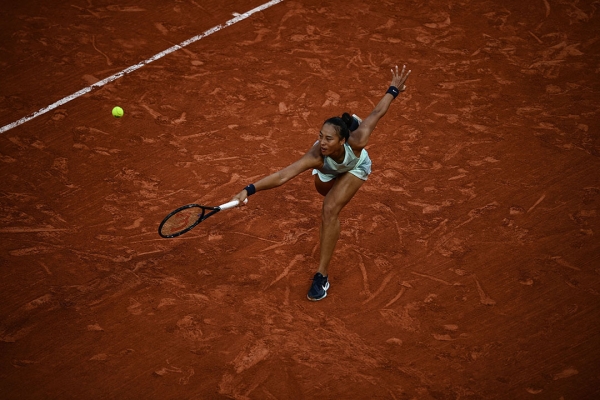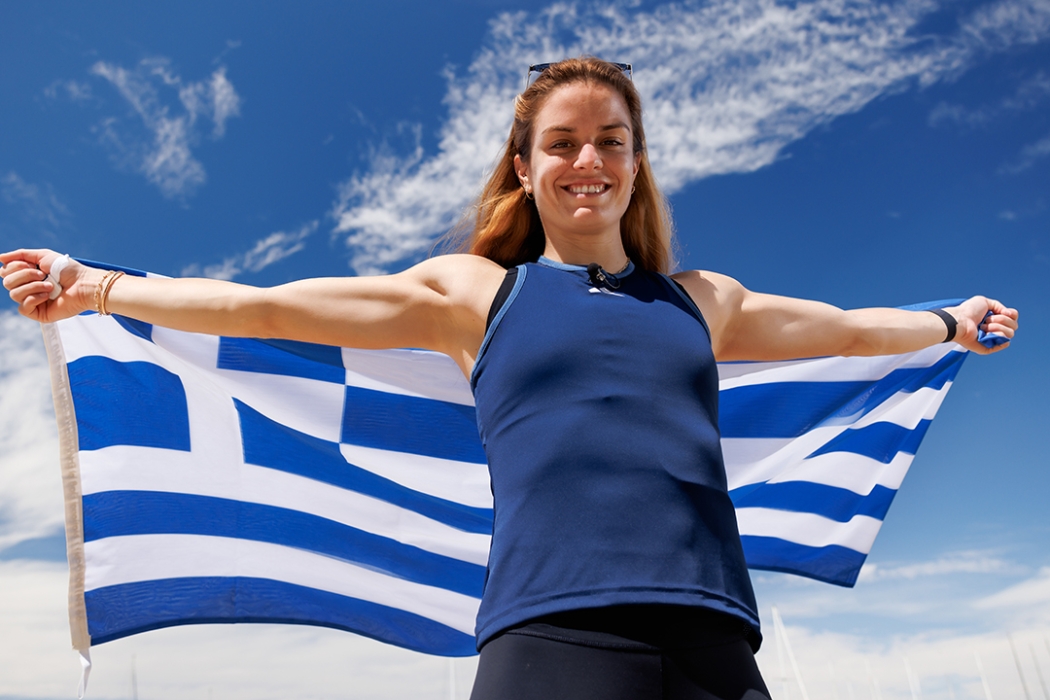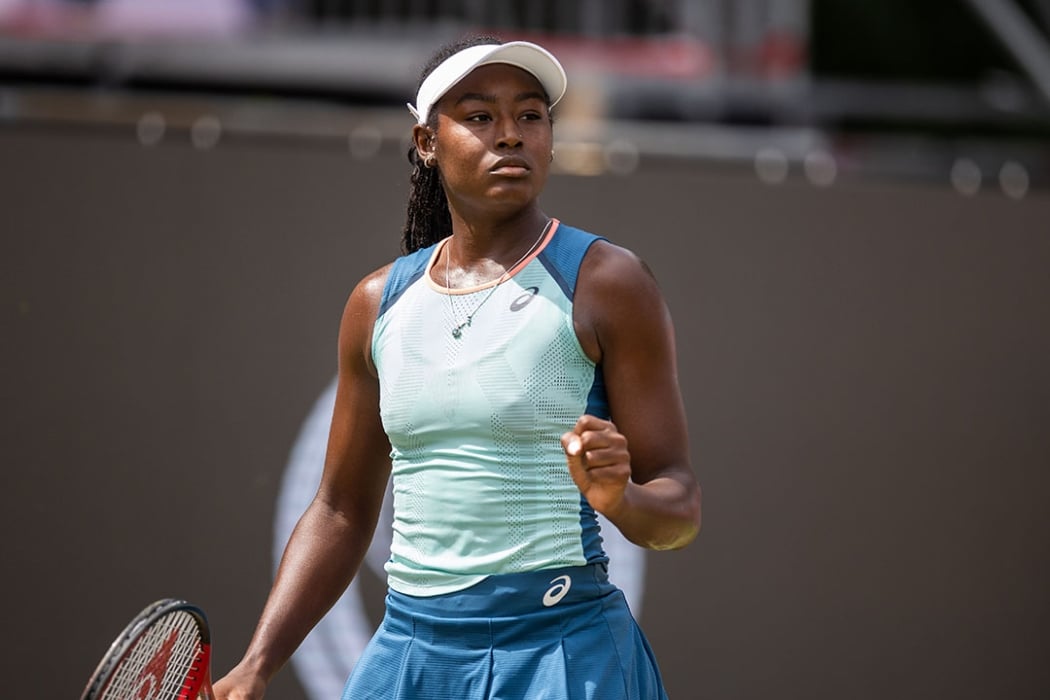Presented by

Zheng Qinwen’s confidence showed as she revealed she wanted to end 2022 in the top 30.
She was ranked outside the top 100 at the time, but that confidence was not misplaced – that’s exactly where she finished.
The 20-year-old Chinese player has enjoyed a stunning rise in the sport, truly beginning to realise the talent that was identified by IMG and Li Na’s husband and honed by Carlos Rodriguez and former ATP pro Pere Riba.
Li Na welcomes the future of women’s tennis in Asia to Wimbledon. From L to R: Wang Xiyu, Wang Xinyu, Li Na, Zheng Qinwen and Naomi Osaka #IMGTennis pic.twitter.com/J5i7kUGfJD
— IMG Tennis (@IMGTennis) July 5, 2018
"Inside I always believed I could be better, I just had to do it,” she told wtatennis.com. “I wanted to do something great in tennis.”
“Great” is an efficient way to summarise her ascent.
Zheng was ranked 630th in mid-August 2020, before winning eight consecutive ITF finals across 2020 and 2021.
She made it nine straight at the WTA 125K tournament in Valencia in 2022, her streak eventually snapped in the WTA Tokyo final by Liudmila Samsonova in late September.
Despite the loss, that performance vaulted her inside the top 30, fulfilling her goal.
thing i learned yesterday: chinese press and fans call zheng qinwen “rocket girl” b/c of her rapid rise.
— Courtney Nguyen (@FortyDeuceTwits) May 29, 2022
probably a cooler nickname than the one i had for her, which was simply Baby Q.
It all happened while she was still a teenager; she turned 20 in October.
While Zheng may not have won any WTA-level events in 2022, she significantly impacted the women’s tour.
She won 14 of her first 17 matches – including a semifinal at the Melbourne Summer Set 1 and qualifying for AO 2022 – to quickly crack the top 100.
She beat Bianca Andreescu, Sloane Stephens, Simona Halep, Jelena Ostapenko, Garbine Muguruza, Ons Jabeur and Paula Badosa.
Having never before played in a Grand Slam main draw, she won at least a round at all four of them, going furthest at Roland Garros, where Iga Swiatek eventually stopped her in the last 16.

Swiatek was the dominant No.1 who was barely losing sets. But twice Zheng stretched the Polish superstar to three sets, first in Paris, and later in San Diego.
“I felt on my racquet today that she can play some really heavy topspin,” Swiatek commented at Roland Garros. “I feel like if she's going to use it the right way she can really be a great player.”
Swiatek was not the only player impressed by Zheng’s abilities.
TICKETS: Catch Zheng Qinwen in action at Australian Open 2023
Zhang Shuai was the top seed at an ITF event in Dubai in November 2021, but was overpowered by her young countrywoman in the second round.
"This is why I didn't go back to China to play the national tournament because I have no chance," Zhang later joked.
That heavy, powerful game was developed in stages throughout her teenage years.
She learned plenty from Rodriguez – former coach of major champions Justine Henin and Li Na – when she worked at the Argentine’s Beijing academy for three years.
She later relocated to Spain and developed further with former world No.65 Riba, who honed her game and strategy on clay.
Rodriguez cemented the connection between Zheng and idol Li, whose athletic, aggressive style was a template for her own.
“He used to talk about how Li Na is playing, how Justine is playing. See those players, that's the goal,” she recalled.
“I was still a child (when Li won Roland Garros in 2011) and then she gave me a dream that, ‘Oh, the Asian player, the Chinese player, also can win the Grand Slam’, and in that moment that I have the dream in my heart that I want to do it like her.”
Li was celebrated for her free-spirited, somewhat rebellious streak, signs of which also exist in Zheng.
After losing to Swiatek in Paris, she broached the still-taboo topic of menstrual symptoms in female athletes.
“I cannot play my tennis, (my) stomach was too much painful,” she explained. “It’s just girls’ things, you know. The first day is always so tough and then I have to do sport and I always have so much pain in the first day. And I couldn’t go against my nature.
“I really wish I can be man (so) that I don’t have to suffer from this. It’s tough.”
Her frank commentary continued as she reflected on her third-round Wimbledon loss to Elena Rybakina.
"When she won the championship, always I congratulate her, for sure, because she deserved that. But it's like, I should get this match. And it's me, I give this championship to her,” Zheng said.
"I know it's not good to say this, but I was really, really pissed about myself for that match."
READ MORE: Players coming in hot to AO 2023
At the US Open, she was asked how she preferred to be addressed; the Chinese convention is for a person’s surname to precede their given name.
“I know some people they call me ‘Kingwen’, some people call me ‘Queenwen’,” she replied.
“You call me whatever you feel comfortable, and if I know it's me, it's fine.”
Moments like these explain why Zheng has increasingly captivated fans and media.
She posed for the pages of the Chinese edition of Harper’s Bazaar, and later featured on the cover of China's Cosmopolitan, and tennis and pop culture publication Racquet.
Zheng Qinwen SHINING for Harper's Bazaar China ✨
— wta (@WTA) September 15, 2022
(More ? on our IG ?) pic.twitter.com/ppi2hqzyMa
Zheng will soon play the Australian Open not as a lesser-known player ranked outside the top 100, but instead a contender seeded at a Grand Slam for the first time.
And on this stage, she is more motivated than ever to thrive.
“I always say that Slam is one of my dreams since I was little,” she said.
“So every time when I arrive here, I will leave everything I have on the court.”

